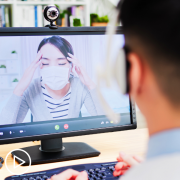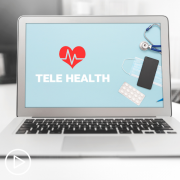Do Telephone-Only Visits Qualify As a Telemedicine Visit?
Do Telephone-Only Visits Qualify As a Telemedicine Visit? from Patient Empowerment Network on Vimeo.
For head and neck cancer patients, do telephone-only visits really qualify as a telemedicine visit? Watch as expert Dr. Samantha Tam from Henry Ford Health System explains care concerns that can be covered in telephone versus video visits – and patients who can benefit from the use of virtual visits.
See More From The Head & Neck Cancer TelemEDucation Empowerment Resource Center
Related Resources:

|
Transcript:
Samantha Tam, MD, FRCSC, MPH:
So from a… Telephone-only visits have a lot of drawbacks to them, I think even virtually assessing a patient with regards to how they’re doing generally, a general physical examination is very important. On top of that, we have a lot of sensitive conversations in patients that have head and neck cancer, so it’s important to also read things like non-verbal body language, so definitely the video component is extremely useful for providers that are caring for patients with head and neck cancer. However, in patients that might not have access to video visits, might not have the technology, I think that the number one priority in our minds is that this patient gets the best care that they are able to get, and whether that this means a telephone-only type of a visit is possible for these patients, we adjust our…I guess we adjust our requirements, we adjust our ability to deliver care based on that, so that might mean touching base with the patient on the phone at first in order to understand exactly what they’re going through, talk them through the next steps so that they know what to accept in order to make their care more streamlined later on. I don’t think that telephone visits will completely replace either virtual visits or in-person visits, but I think that, again, they are a tool, and they’re a tool that especially patients that might be more disadvantaged, such as not having access to good Internet might not have access to the technology required for a virtual visit, those patients need to be considered when we consider utilizing telephone-only care.
What Head and Neck Cancer Treatment Side Effects Can Be Monitored via Telemedicine?
What Head and Neck Cancer Treatment Side Effects Can Be Monitored via Telemedicine? from Patient Empowerment Network on Vimeo.
For head and neck cancer patients, which treatment side effects are acceptable to be monitored via telemedicine? Watch as expert Dr. Samantha Tam from Henry Ford Health System explains vital aspects for monitoring treatment side effects, key symptoms for patients to report, and some patient monitoring methods that are helpful in care.
See More From The Head & Neck Cancer TelemEDucation Empowerment Resource Center
Related Resources:
Transcript:
Samantha Tam, MD, FRCSC, MPH:
One of the most important aspects in terms of treatment side effects is understanding what the patient feels with regards to their symptoms and reporting this to the physician. Something that we’re using at Henry Ford currently is remote patient-reported outcomes measurement, which looks at several domains of symptomology that we are monitoring throughout your treatment. These questionnaires can be completed online remotely at home, and don’t necessarily need an in-patient visit. This is a platform that can be utilized to communicate with providers in order to understand what the treatment side effects might be, and also a standardized way to discuss with your physician exactly what kind of side effects you might have from treatment.
So I think it’s important to be a self-advocate for your care, and so certainly as a provider, I’m happy to hear any kind of concerns that you have about side effects from treatment, pain, bleeding. I think one of the big ones is whether or not you’re doing well with swallowing and how your weight has been. Energy level is another major indicator about how much you’re able to take in and how well you’re tolerating the treatment. All these types of components are important things for us to know throughout your treatment course, and I think speaking up about any kind of concerning symptoms you have is important for your provider to know so that we understand exactly what’s going on.
Tips for a Telemedicine Visit From a Head and Neck Cancer Expert
Tips for a Telemedicine Visit From a Head and Neck Cancer Expert from Patient Empowerment Network on Vimeo.
How can head and neck cancer patients prepare for telemedicine visits? Watch as expert Dr. Samantha Tam from Henry Ford Health System shares her tips for telemedicine best practices and tests that can be helpful used in conjunction with virtual care.
See More From The Head & Neck Cancer TelemEDucation Empowerment Resource Center
Related Resources:

|
Transcript:
Samantha Tam, MD, FRCSC, MPH:
So in head and neck cancer, a lot of the virtual visits are mainly based on obtaining a clinical history and having a discussion with your provider verbally as opposed to a lot of physical examination, this is unfortunately the limit of virtual care, and definitely, especially in head and neck cancer, a lot of our examination is through into your ears, into your nose, into your mouth with endoscopic examinations weaved into it, and definitely like CT scans are useful as a modality, as a modality of investigation to have ready prior to your visit with your head and neck cancer provider. Tips that I have for families and for patients that are facing a diagnosis of head and neck cancer before your virtual visit is to make sure that you have any kind of questions that you have written down so that you can make sure that your provider is able to go through each one of these questions to ensure that you have a good understanding of exactly what the next steps are, or what the diagnosis is and what the plan might be moving forward.








